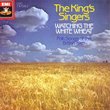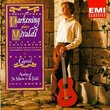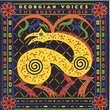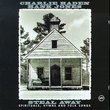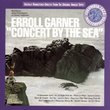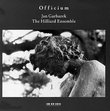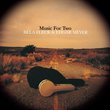| All Artists: Johann Sebastian Bach, countertenor David James, violin Christoph Poppen, soprano Monika Mauch, tenor John Potter, Hilliard Ensemble, baritone Gordon Jones Title: Morimur Members Wishing: 1 Total Copies: 0 Label: ECM Records Original Release Date: 1/1/2001 Re-Release Date: 9/25/2001 Genre: Classical Styles: Opera & Classical Vocal, Chamber Music, Historical Periods, Baroque (c.1600-1750), Classical (c.1770-1830), Instruments, Strings, Sacred & Religious Number of Discs: 1 SwapaCD Credits: 1 UPC: 028946189528 |
Search - Johann Sebastian Bach, countertenor David James, violin Christoph Poppen :: Morimur
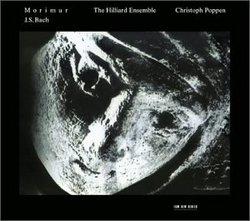 | Johann Sebastian Bach, countertenor David James, violin Christoph Poppen Morimur Genre: Classical
In 1994, explains the booklet that accompanies Morimur, Professor Helga Thoene made the surprising discovery that the monumental "Ciaccona" from Bach's Partita in D minor for solo violin was built around various chorale t... more » |
Larger Image |
CD DetailsSynopsis
Amazon.com's Best of 2001 In 1994, explains the booklet that accompanies Morimur, Professor Helga Thoene made the surprising discovery that the monumental "Ciaccona" from Bach's Partita in D minor for solo violin was built around various chorale themes hidden in the music. From the texts of these "secret" chorales and other symbolic musical devices, she deduced that the "Ciaccona" was an epitaph for Bach's wife, Maria Barbara. The revelation might have remained an intriguing (and touching) footnote to Bach scholarship if baroque violinist Christoph Poppen hadn't had the bright idea of taking Professor Thoene's discovery off the library shelves and placing it triumphantly in the concert hall. On this disc, his performance of all five movements of the whole Partita (BWV 1004) is interspersed with the various chorales hidden inside the "Ciaccona," sung with breathtaking precision by the Hilliard Ensemble. The double whammy comes at the end when the "Ciaccona" is performed again, this time with the singers bringing out the secret melodies. Poppen's playing is excellent, both sweet-toned and vibrant, while the Hilliards have never sounded better: the combination of the two is spine-tingling. It is as if Maria Barbara's proper epitaph has finally been realized, and a moving and wonderfully stimulating recording created in the process. --Warwick Thompson Similarly Requested CDs
|
CD ReviewsBaroque Mysticism Joanne Fisher | Harrison Township, MI USA | 10/23/2001 (5 out of 5 stars) "This album attempts (and largely succeeds, in my opinion) to make clear to the listener what musicologists are exploring theoretically: that J.S. Bach used concepts of numerology to write a subtext within his Six Sonatas and Partitas for Violin.The Six Sonatas and Partitas have long been a favorite of mine. Vocalists hold the vocal line of several familiar Chorales against the solo violin part, and demonstrate that Bach used the Chorales as an unheard cantus firmus for the solo violin part.I enjoy this recording not only for the musicological exercise but because the end result is richly satisfying simply to the casual listener. It brings a whole new dimension to the Partita. Often music theorists expound ideas which are visible only on the printed page, not audible to listeners, or at least not audible to other than highly specialized listeners. In this album, for once we get a chance to actually hear the results." Divine nathaniel cabot | Boston, MA | 01/11/2002 (5 out of 5 stars) "The Austrian Monastary where this recording was made must have inspired the artists to achieve the results that are evident on this album. Pitch perfect four part vocals combine with Baroque violin to transport the listener to a spiritual place Bach surely intended. And I am not even particularly religious. Let it suffice to say, for anyone with a modicum of appreciation for harmony and melody, this music will provide much enjoyment." A Very Unique Experience kelsie | Plainview, Texas United States | 09/13/2004 (5 out of 5 stars) ""Morimur," as you can read (ad nauseum) on the rest of the page, is the product of an astonishing amount of Bach scholarship on the part of Professor Helga Thoene, a noted Bach scholar. It is important to note two things: 1) Thoene's research applies ONLY to the Partita II D Minor, not to the Six Solos from which it comes as a whole, and 2) The CD contains ONLY the Partita and associated chorales, NOT any of the other Six Solos. Morimur is a truly intriguing experience, quite unlike anything else in all of Bach's music. Thoene has reconstructed a number of "chorale fragments" within the monumental "Ciaccona" movement of the Partita, making the claim that the presence of these fragments in the music validates the belief that the Ciaccona was originally meant as a musical epitaph for Bach's first wife, Maria Barbara, who died suddenly and was buried while Bach was away. Thoene provides a number of musical examples from the score to the Ciaccona that demonstrate her theory in action, and these examples are critical for a layperson (such as myself) to come to an understanding of her theory (which can only be proven by studying the WRITTEN music, not listening to the Ciaccona itself). The disc contains the entire D Minor Partita, played wonderfully by Baroque violinist Christoph Poppen, as well as the associated chorales whose fragments appear in the Ciaccona, sung by the Hilliard Ensemble. The disc concludes with a magical second performance of the Ciaccona by Poppen (a completely different performance, not just a simple copy of his earlier, unaccompanied performance on the disc). As he plays this most difficult and monumental of string works, the Hilliards sing the chorale fragments atop his melody, putting Helga Thoene's research into practical use. The effect is dazzling and moving, opening new horizons for this piece that listeners will never forget. The Hilliards balance perfectly with the violin, never overwhelming it, but always making themselves heard. As for Poppen, he is wilfully expressive and brings a unique voice to the Ciaccona and to the Partita D Minor as a whole, and it is a shame that he has not recorded the remainder of the Six Solos. This is certainly a unique disc, one that will challenge the way many people view the Ciaccona and the omnipresence of symbolism in Bach's music."
|

 Track Listings (21) - Disc #1
Track Listings (21) - Disc #1